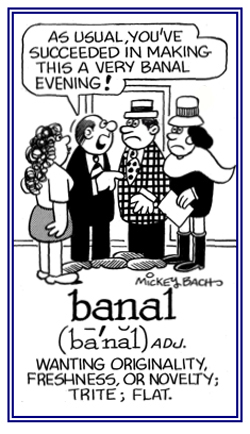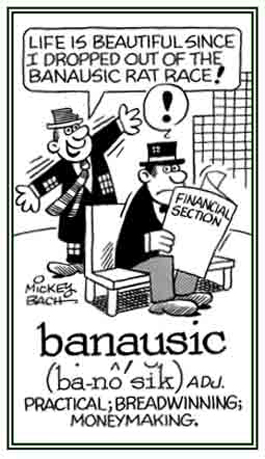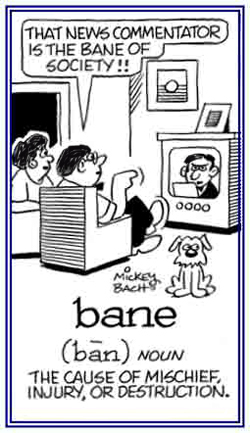English Words in Action, Group B
(a variety of English words which have developed through history and are currently used in our modern age)
Simply click on this banner (or the following link) and you will be on your way to stimulate your brain for greater word comprehension with quizzes based on some of the words in this unit.
The school has banned students from using cell phones in all classes.
The city council is banning smoking in restaurants.
2. Dull, especially due to overuse or over familiarity: The editor rejected the author's work because it was too trite and banal.
3. Etymology: banal comes from an old meaning of ban, "force of vassals called to arms", hence, "common folk".
The ending -al was later added to form an adjective: banal. In medieval France and England, a banal mill was a mill where feudal tenants were legally obliged to have their wheat ground, and the banal oven was where bread was baked; at rates fixed by the landlord.
The word almost died out, but was revived in the 18th-century journalese as a synonym for "vulgar" or "commonplace" from its association with the common people. It has been generalized through "open to everyone" to "commonplace, ordinary", then to "trite, petty".


Go to this Word A Day Revisited Index
so you can see more of Mickey Bach's cartoons.
2. The quality of being ordinary or unimaginative: Mildred's writing style apparently never rose above banality.

Go to this Word A Day Revisited Index
so you can see more of Mickey Bach's cartoons.
The citizens in the community sent a BANANA message to the electric company that they should not construct any new electrical wiring over their homes.
The World Trade Organization (WTO) has consistently ruled against how the EU set tariffs for bananas, forcing the 27-country bloc to over haul a system that grants preferential conditions for producers from African and Caribbean countries, mainly former British and French colonies.
2. Pertaining to something which serves practical purposes only; mechanical or functional: The banausic architecture of the new building was designed to be more serviceable and useful than innovative, creative, or imaginative.

Go to this Word A Day Revisited Index
so you can see more of Mickey Bach's cartoons.
2. Orchestras, an ensemble, groups: Two different musical bands played until midnight last evening.
3. A binding, a ribbon, a sash, a belt, a collar, a girdle: Daria's hair was held in place by a velvet band.
Dark bands of clouds were forming on the horizon indicating the coming of a rainstorm.
2. To attach a tag or an identification marker to an animal so its movements can be tracked: The veterinarian was careful when she was banding Mary's dog.
Amazingly, when the dog was lost as a result of a storm, it was found by Alanna some miles away and because it was banded, she was able to return the dog to Mary.
The extreme heat of the summer has been the bane of the populations in several countries this year.
2. Etymology: from Old English bana, "destruction".
Go to this Word A Day Revisited Index
so you can see more of Mickey Bach's cartoons.

Go to this Word A Day Revisited Index
so you can see more of Mickey Bach's cartoons.
2. Value for the money spent or a favorable cost-to-benefit ratio: It does matter what gets built: the country spent too much on increasingly wasteful roads and bridges, and not enough in areas like education and social services, which studies show deliver more bangs for the bucks than infrastructure spending.
2. To abolish, to forbid, or to get rid of that which is not wanted: Mildred banished any further relations with her unfaithful husband.
For health reasons, Mike and his wife decided to banish the excessive use of sugar in their diets.
Some political prisoners have been existing in banishment for far too many years.
Whenever Mary and Sam go out on dates together, they banter back and forth and those who hear them quite often laugh at them for being so silly!

Go to this Word A Day Revisited Index

© ALL rights are reserved.
Go to this Word A Day Revisited Index

The barges were being used to move more fuel down the large natural stream.
Most barges on inland waterways are towed, but some of them are self-propelled.
In use since the dawn of history, barges were common on the Nile in ancient Egypt and some of them were highly decorated and used for carrying royalty.
Links to all of the groups of English words in action, Groups A to Z.
You may see the bibliographic list of sources of information for these words in action.


